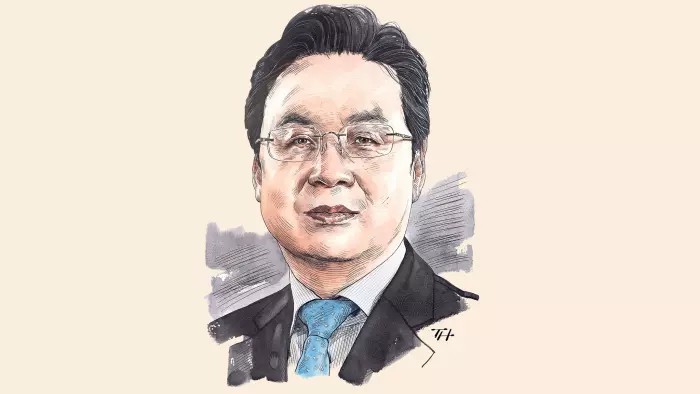|
养老投资
嘉实将养老金业务定位为长期战略业务,深度涉足包括主权财富和基本养老保险基金、企业/职业年金、养老目标基金在内的三大养老业务 养老投资主页 |
|---|
 本文相关基金
本文相关基金
更多
 相关资讯
相关资讯
 嘉实动态
嘉实动态
嘉实基金总裁赵学军接受英国《金融时报》专访:“在中国投资依然有免费的午餐”
近日,嘉实基金总裁赵学军在伦敦接受了英国《金融时报》(Financial Times)的专访。赵学军博士介绍了嘉实基金的战略目标,并对中国资本市场进行了深度剖析。
以下为中文翻译及英文原文:
嘉实基金总裁赵学军博士:
“在中国投资依然有免费的午餐”
记者:Chris Flood

插画师 Tony Healey
“我们视贝莱德(BlackRock)为对标基准。”——嘉实基金总裁赵学军
2000年,赵学军就任嘉实基金总裁,成为中国基金公司中最年轻的总裁。“现在我已经是中国基金业任职最久的总裁了。”赵学军用英语调侃道。这是他首次接受境外媒体的深度专访。
今年50岁的赵学军还在清华大学五道口金融学院担任讲师。他感慨:“很庆幸,我出生在一个重视高等教育与人才培养的时代。”赵学军的父母都是教师,不过在他看来,中国的孩子不应只关心学习成绩。
“我的背景看上去更像是一位学者,但我告诉自己的两个孩子,你们不要只关心学习成绩,还要热爱体育运动。”赵学军说,他非常喜欢跟家人、朋友一起打网球、滑雪旅行。
“我喜欢富有活力和挑战性的体育运动。体育让我们保持强壮、结识好友,运动之后还可以一起喝上一杯。”这位总裁笑称,苏格兰威士忌和茅台都是他的最爱。
在赵学军的领导下,嘉实基金已经成长为中国规模最大的投资管理公司之一,旗下资产管理规模达到1100亿美元,覆盖股票、固定收益、房地产、基础设施以及最新扩展的私募股权基金。目前,嘉实基金拥有超过1300名员工,其中包括200余名专业投研人员和50位博士。
“我们把贝莱德作为对标基准。嘉实基金是一家非常有品质的公司,是中国资产管理领域的先行者,我们已经与国际投资机构的水准接轨。”赵学军介绍。
嘉实在创建之初主要面向个人投资者,而如今机构投资者已经占据其资产管理规模的半壁江山。在国内,嘉实基金专注于内生性增长,非常注重产品的创新,尤其是针对保险公司、银行客户的固定收益产品。放眼海外,嘉实基金分别于2008年、2011年、2015年在香港、纽约、伦敦设立了全球业务根据地。
“海外投资者低配中国,而中国投资者也未较多涉足海外市场。这为我们带来了巨大的市场机遇。”赵学军说。
2005年,德意志资产管理公司参股嘉实,嘉实成为合资公司。今天,嘉实基金对建立新的合作伙伴关系依然保持开放态度。赵学军进一步介绍:“我们已经与德意志资产管理建立了非常好的合作关系,希望进一步将嘉实的品牌推向全球。因此,我们期望携手其他伙伴提升我们的产品制造或渠道分销能力,特别是那些在细分领域拥有投资专长的合作伙伴。”
2015年中国股市的大幅波动,曾导致上交所超过半数的股票停牌,这让一些海外投资者对在中国投资保持谨慎。对此,赵学军分析:“中国尚未形成一个有效的市场。在这种市场上投资,更像是在蘑菇包上而不是在平缓的雪道上滑雪。”不过,他也指出,曾经忽略中国公司的国际投资者,也错失了如互联网社交娱乐企业腾讯、电商巨头阿里巴巴等中国公司股价大幅飙升的良机。
他还提醒国际投资者,不要等到MSCI决定将中国A股市场纳入其新兴市场指数后再进场,在他看来,传统的市值加权基准很难反映中国经济和社会的转型升级所带来的机遇,“那些成功实现从‘中国制造’到‘中国创造’转型的公司将有优异的业绩表现。”
赵学军边拿起自己的手机,边说到,一部智能手机就包含约18000项专利,而专利保护知识产权免受侵犯,是创新能力的重要体现。基于此,嘉实基金推出了以专利技术价值为维度选取优质高科技企业样本股的指数,并将此应用到中国的环保、医药等领域。
“在嘉实,我们坚信深度的基本面研究,因为每一笔投资都离不开信息的深度分析。中国市场存在巨大的信息不对称,我们面对的挑战是如何既深入了解各家公司,又深度理解整个行业。”他表示。
在赵学军看来,中国人口是美国人口的四倍,但与北美市场相比,中国医疗保健板块占整个中国股票市场的比重却很低。“如此说来,超配中国的医疗股票是否还像第一眼上去那样是个风险呢?那些懂得从非传统信息源解读数据的投资者仍然可以在中国吃到免费的午餐。”
对数据充满激情的赵学军,在嘉实之外还推进一个小项目,主要通过监测各种经济和市场预测来评估哪些机构做出的预测最为可靠。这个项目让他更加相信,中国房地产市场的一些价格泡沫问题能够在不引发大范围危机的情况下得到解决。
“担心是肯定的。不过,房地产价格泡沫不会导致中国资本市场或整个经济出现系统性问题。”赵学军说。
的确,赵学军希望在中国房地产市场探索更多投资。嘉实基金已经推出了数个小型私募房地产基金,并且正在着手准备,希望从监管机构获得在国内开展REITs的资格,赵学军相信REITs相关政策有望在今年晚些时候出台。
去年,由于担心投资者购买不适宜的产品而面临亏损,中国监管机构对不合规的私募基金进行了整顿。
赵学军同时担任中国证券投资基金业协会兼职副会长一职。据他估计,私募基金市场近期的增长三分之二得益于从地区和地方政府向风险投资和私募股权管理公司的合理分配。不过,他同时表示,私募存在着一些问题,比如诚信。
“监管机构正在坚定推进整顿方案。对于个人投资者或许产生了一些损失,不过也意味着一旦问题得到解决,私募基金市场将迎来更加健康的发展。” 赵学军说。
英文原文
‘Investors can still enjoy a free lunch in China’
Chris Flood
‘We see BlackRock as our benchmark,’ says the CEO of Harvest Fund Management
Henry Zhao was the youngest head of a Chinese asset manager when he was appointed chief executive of Harvest Fund Management in 2000.
“And now I am the longestserving chief executive of a Chinese asset manager,” says Mr. Zhao, speaking in English in his first in-depth interview with a non Chinese newspaper.
“I am lucky, part of a lucky generation that was encouraged to become highly educated and well trained,” says the 50yearold, who is also a lecturer at Tsinghua University’s Finance Institute.
Both his parents were teachers but he believes that Chinese children should not focus only on pursuing academic achievements.
“My background is more like a scholar, but I tell my two sons to love their sports and not to focus solely on their academic scores,” he says. Mr. Zhao enjoys playing tennis and skiing trips with his family and friends.
“I like active, challenging sports. Sport helps us to stay strong, to make friends and then enjoy a drink together afterwards,” says the chief executive who happily admits to enjoying both scotch whisky and the potent Chinese spirit maotai.
Under Mr Zhao’s leadership, Harvest has developed into one of China’s largest investment managers. It has $110bn in assets spread across equities, fixed income, property, infrastructure and, more recently, private equity. It employs more than 1,300 staff, including 200 investment professionals and 50 PhDs.
“We see BlackRock as our benchmark. Harvest is a high quality company, a pioneer in asset management in China, and we have reached the standards required by international institutional investors,” he says.
Harvest started as a retail investorfocused manager but institutional investors now account for more than half of its mainland assets. Within China, Harvest plans to focus on organic growth with a strong emphasis on developing new products, particularly in fixed income for insurance companies and banks.
Outside China, Harvest established operations in Hong Kong in 2008, New York in 2011 and London in 2015.
“International investors are underweight China and Chinese investors are underweight in terms of their international exposures. This presents big opportunities,” he says.
A joint venture in China was established in 2005 with Deutsche Asset Management and Harvest is open to forging agreements with new partners.
“We already have a very good relationship with Deutsche and we want to further develop the Harvest brand internationally, so we are open to talking to other partners to expand our manufacturing or distribution capabilities, particularly those with niche investment expertise.”
Some international investors remain wary of investing in China after volatile swings in equity prices during 2015 led to the temporary trading suspension of more than half of the stocks listed on the Shanghai exchange.
“China is not yet an efficient market. It can seem like skiing on moguls, rather than on a smooth piste,” he says, while pointing out that foreign investors that have avoided Chinese companies have missed out on the huge price appreciation of stocks such as Tencent, the internet and telecommunications provider, and Alibaba, the ecommerce group.
He also urges international investors not to delay until MSCI, the index provider, decides to fully include China’s Ashares market in its emerging markets index, arguing that traditional market capitalisationweighted benchmarks provide little guidance to the opportunities developing in response to structural shifts in the Chinese economy and society.
“Companies that successfully manage the transition from ‘made in China’ to ‘created in China’ will do especially well”, he says.
Holding up his smartphone, Mr. Zhao notes that it contains around 18,000 patents. This led Harvest to develop an index weighted by the revenues technology companies generate from patents that protect their intellectual property from predators. Harvest plans to extend this methodology to China’s environmental protection industry and the pharmaceutical sector.
“We really believe in deep fundamental research at Harvest, as every investment is based on information. There are huge asymmetries of information in China, so the challenge lies in developing a deep understanding of both individual companies and industries,” he says.
China’s population, he notes, is four times the size of the US and yet Chinese healthcare is just a tiny weight in its stock market in comparison with the same sector in North America.
“So is a heavily overweight position in Chinese healthcare stocks really the risk it might first appear? Investors that understand how to interpret data from non traditional sources can still enjoy a free lunch in China,” he says.
Data are a passion for Mr. Zhao, who oversees a side project outside of Harvest that monitors numerous economic and market forecasts to assess which organisations make the most reliable predictions.
This work has strengthened his confidence that pricing bubbles in parts of China’s property market can be resolved without causing a wider crisis.
“For sure there are concerns. But the bubble in property prices will not lead to systemic problems for China’s capital markets or the wider economy”.
Indeed, Mr. Zhao would like to encourage more investment in China’s property market. Harvest has already launched a number of small private real estate funds and has been working to secure approval from Chinese regulators for real estate investment trusts that Mr Zhao hopes will be launched later this year.
Last year, Chinese supervisors cracked down on the unregulated private funds market amid concerns that investors will face losses after being sold unsuitable products.
Mr. Zhao, who also serves as vicechairman of the Asset Management Association of China, an industry body, estimates that twothirds of the recent growth in the private funds market has been driven by legitimate allocations from regional and local governments to venture capital and private equity managers. But he agrees that there have been problems with private placements, where there has been cheating.
“Regulators are pushing their reform programme very hard. There will be some losses for retail investors but there will be a healthier future for the private funds market once these problems are solved.”
来源:2017年3月6日英国《金融时报》






